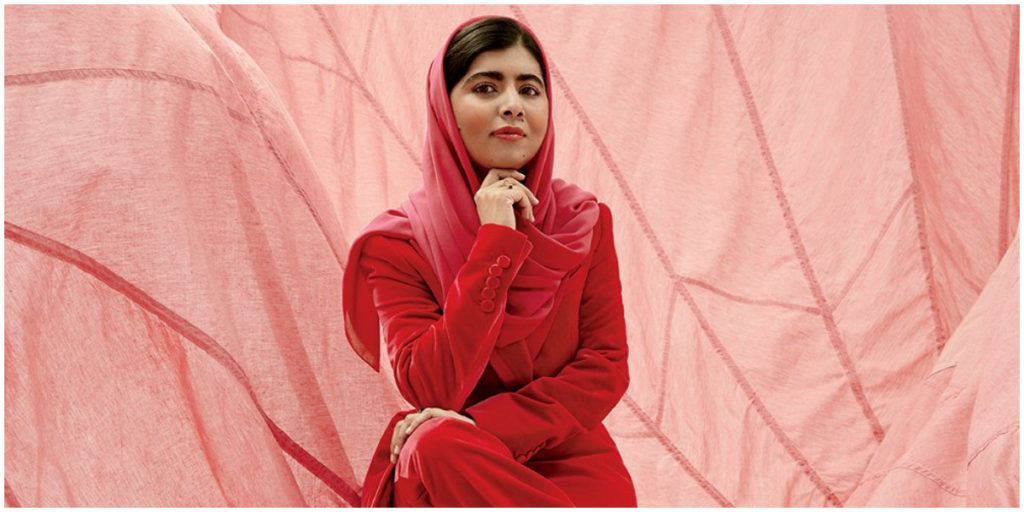
Nobel laureate Malala Yousafzai recently spoke at an international event about the representation of Muslims in Hollywood, citing Muslim actors only make up 1% of popular television series leads, reported Variety Magazine.
Variety Magazine held an event titled ‘Power of Women’ where Malala was amongst those who were honoured for being a creative leader, alongside Hillary Clinton, Chelsea Clinton, Elizabeth Olsen, Oprah Winfrey and Ava DuVernay.
Abbott Elementary creator Quinta Brunson presented Yousafzai with her Variety honor, calling her one of “the most influential advocates of our time.”
The Oxford University graduate now heads her own film and TV production company, Extracurricular. At the heart of her first projects is a rich diversity that reflects Yousafzai’s resolve to tell representative stories that haven’t always had a place in Hollywood.
“I learned that Asian people like me make up less than 4% of leads in Hollywood films. Muslims are 25% of the population, but only 1% of characters in popular TV series,” she underscored at the Power of Women dinner.
Malala Yousafzai discusses the lack of representation in film: “I learned that Asian people like me make up less than 4% of leads in Hollywood films. Muslims are 25% of the population, but only 1% of character in popular TV series” | Variety #PowerOfWomen presented by @lifetimetv pic.twitter.com/WBmgjOl0Ep
— Variety (@Variety) September 29, 2022
In her latest interview in Variety, Malala revealed the first slate of projects by Extracurricular. The outfit, which is headed by Yousafzai and her head of production Erika Kennair, struck a multi-year programming deal with Apple TV+ last year.
Among her first projects are a feature documentary with A24 about South Korea’s matriarchal Haenyeo society of elderly fisherwomen, currently in production; a scripted series based on Asha Lemmie’s coming-of-age novel Fifty Words for Rain, about a woman’s search for acceptance in post-World War II Japan; and a feature film with Don’t Look Up director Adam McKay and his production company, Hyperobject, based on Elaine Hsieh Chou’s book Disorientation — a satire about a college student’s revealing dissertation about a young poet.
Read: Malala Yousafzai partners with Apple to produce inspirational content
Malala is also throwing her influence behind Riz Ahmed’s Pillars Artist Fellowship, which supports emerging Muslim directors and screenwriters. The program is timely, with Malala having cited new data from a recent USC Annenberg Inclusion Initiative during her speech.
Read more: Riz Ahmed launches initiative to change Muslim representation in world cinema
“I know that the executives have passed on dozens of quality, equally amazing projects because they thought that the characters or their creators were too young, too Brown, too foreign, too poor,” she remarked. “Sometimes it feels like they’re saying we just don’t belong here.”
“I’m a woman, a Muslim, a Pashtun, a Pakistani and a person of color. And I watched Succession, Ted Lasso and Severance, where the leads are white people — and especially a lot of white men. If we can watch those shows, then I think audiences should be able to watch shows that are made by people of color, and produced and directed by people of color, with people of color in the lead. That is possible, and I’m gonna make it happen,” she said.
Speaking at Variety’s event, Yousafzai spoke about the formative experience at 11 years old that set her on a path toward activism, pushing to champion creative perspectives from diverse and underrepresented backgrounds in the entertainment industry.
“I know the tale of having a dream and being told to forget it,” Yousafzai said. “Today, I am a storyteller, activist and producer.”
Stepstool sisters 👯♀️ thank you so much, @quintabrunson ❤️ https://t.co/4I4i75BWk0
— Malala (@Malala) September 29, 2022





